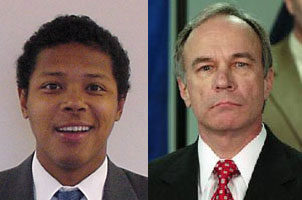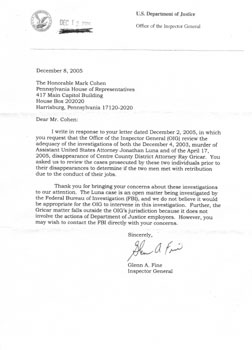U.S. Justice Dept. to Pennsylvania:
'Drop Dead'The Justice Department summarily refuses
independent investigation of Luna, Gricar cases
Posted December 12, 2005 -- In a stinging rebuke to concerned Pennsylvanians and the friends and families of two mysteriously silenced prosecutors, Inspector General Glenn A. Fine of the U.S. Justice Department has summarily refused to investigate the cases involving slain Assistant U.S. Attorney Jonathan Luna and missing Centre County DA Ray Gricar. Inspector General Fine instead asserts that the FBI should be allowed to investigate its own ongoing cover-up of Luna's death.
Drop dead : The U.S. Justice Department has sent a message that the friends and families of Jonathan Luna and Ray Gricar shouldn't expect a real investigation any time soon.
The Inspector General Fine's office took only six days to reply to a request by Pennsylvania state representative Mark Cohen to independently examine the Luna and Gricar cases.
In a letter dated December 8, 2005 (click here to download a PDF version), Inspector General Fine wrote state Rep. Mark Cohen (D-Philadelphia):
"I write in response to your letter dated December 2, 2005, in which you request that the Office of the Inspector General (OIG) review the adequacy of the investigations of both the December 4, 2003, murder of Assistant United States Attorney Jonathan Luna and of the April 17, 2005, disappearance of Centre County District Attorney Ray Gricar. You asked us to review the cases prosecuted by these two individuals prior to their disappearances to determine if the two men met with retribution due to the conduct of their jobs.
"Thank you for bringing your concerns about these investigations to our attention. The Luna case is an open matter being investigated by the Federal Bureau of Investigation (FBI), and we do not believe it would be appropriate for the OIG to intervene in this investigation. Further, the Gricar matter falls outside the OIG's jurisdiction because it does not involve the actions of Department of Justice employees. However, you may wish to contact the FBI directly with your concerns.
Sincerely,
Glenn A. Fine
Inspector General"In the hours before his death on December 4, 2003, Luna was immersed in problems created by the misadventures of the Baltimore FBI field office's "Safe Street Task Force," and the bureau's carte blanche handling of paid FBI informant and heroin dealer Warren Grace.
Not so Fine: The U.S. Justice Department's Inspector General Glenn Fine says the FBI should be allowed to investigate its own cover-up in the death of Jonathan Luna. Click here to download letter in PDF format.
In the days leading up to Luna's death, defense attorneys discovered that informant Grace had escaped home confinement, and was accused of shooting up his neighborhood and dealing heroin. Heroin was also found in Grace's vehicle on the same day the Dawsons' house infamously burned down in Baltimore.
Defense attorneys complained that Luna attempted to cover up the Baltimore FBI scandal by not properly disclosing information to defense lawyers in the case. The day before Luna's gruesome murder, a federal judge had ordered an investigation into the handling of Luna's FBI informant. The night of his death, Luna repeatedly expressed doubts about the legality of a plea agreement designed to protect the FBI and the Justice Department from investigation in the matter. Luna never completed the plea deal before his death.
Despite Inspector General Fine's assertion that "The Luna case is an open matter being investigated by the Federal Bureau of Investigation (FBI), and we do not believe it would be appropriate for the OIG to intervene in this investigation," the Inspector General's office in the past has become involved with other "open" investigations, particularly after Congress intervenes.
Most recently, in September 2005, Fine's office issued a report critical of the FBI's handling of informants, including the open case of Boston fugitive James J. "Whitey" Bulger.
Congressional hearings in 2004 on the Bulger case revealed that the FBI for decades knowingly kept murderers on its informant payroll, looked the other way while its paid informants committed murders, and allowed innocent people to go to jail to protect its informant program from public scrutiny. Several decades after the FBI began its cover-up of this, a retired FBI agent was arrested for paying his former mob informants to kill a casino owner, while another agent stands accused of tipping off Bulger that his arrest was imminent, causing Bulger to flee. The FBI agents had become mob informants.
One prosecutor told Congress, "(I)f you go against the FBI they will get you. They will wage war on you.... (It) would have precipitated World War III if I tried to get inside the FBI to deal with informants. That was the holy of holies, the inner sanctum."
At the time of Luna's death, the House Committee on Government Reform had begun investigating the FBI's unlawful and overly cozy relationship with criminal informants. In 2004 the committee issued a report titled, "Everything Secret Degenerates: The FBI's Use of Murderers as Informants."
In hearings, prosecutors testified that they feared retaliation from the FBI if they blew the whistle on any of these activities. In his book The Midnight Ride of Jonathan Luna, writer Bill Keisling points out:
As for the subject of this book, Jonathan Luna, and his problems with the FBI and its informants, the report describes an alarming dynamic in the relationships between prosecutors and FBI agents. We begin to understand the squeeze that a tight-lipped Luna must have felt his last day of life, in court, when the explosive issues of Warren Grace, the FBI and its informants, ticked away.
The report relates:
"Former U.S. Attorney Jeremiah O'Sullivan testified that there were fundamental problems between federal prosecutors and FBI investigators. O'Sullivan stated, for example, '[I]f you go against [the FBI], they will try to get you. They will wage war on you. They will cause major administrative problems for me as a prosecutor.' O'Sullivan also testified that it 'would have precipitated World War III if I tried to get inside the FBI to deal with informants. That was the holy of holies, inner sanctum. They wouldn't have allowed me to do anything about that.' O'Sullivan had so little confidence in the FBI that he recommended that federal agencies other than the FBI participate in a state investigation of Bulger.... Upon learning that O'Sullivan circumvented the FBI, the head of the Boston FBI office berated O'Sullivan for targeting bureau informants for investigation."
In time, the congressional report says, more than twenty people would be murdered by FBI's Boston informants, often with the help of agents. This went on into the mid-1990s, at least.
More recently, on December 4, 2005 (coincidentally the second anniversary of Luna's death), The New York Times reported it had obtained a draft report of the Inspector General's Office dated November 15, 2005, which concludes, the newspaper reported, that, "Officials at the Federal Bureau of Investigation mishandled a Florida terror investigation, falsified documents in the case in an effort to cover repeated missteps and retaliated against an agent who first complained about the problems, Justice Department investigators have concluded."
The agent who was retaliated against for coming forward, Mike German, "emerged as the latest in a string of whistle-blowers at the bureau who said they had been punished and effectively silenced for voicing concerns about the handling of terror investigations and other matters since Sept. 11, 2001," the Times reported.
"I still love the F.B.I., and I know that there are good, honest, hard-working agents out there trying to do the right thing, and this hurts all of them," the Times quoted German.
Sen. Charles Grassley (R-Iowa), was quoted as saying, "Unfortunately, this is just another case in a long line of F.B.I. whistle-blowers who have had their careers derailed because the F.B.I. couldn't tolerate criticism."
Curious, then, that Inspector General Fine now writes to concerned citizens in the matter of Jonathan Luna and Ray Gricar, "you may wish to contact the FBI directly with your concerns."
By failing to properly investigate itself, as in the Luna case, the FBI and the Justice Department has historically risked the safety and lives of innocent Americans.



